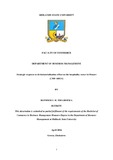Please use this identifier to cite or link to this item:
https://cris.library.msu.ac.zw//handle/11408/2375Full metadata record
| DC Field | Value | Language |
|---|---|---|
| dc.contributor.author | Mwarehwa, Bothwell H. | - |
| dc.date.accessioned | 2017-06-30T08:09:28Z | - |
| dc.date.available | 2017-06-30T08:09:28Z | - |
| dc.date.issued | 2016-09 | - |
| dc.identifier.uri | http://hdl.handle.net/11408/2375 | - |
| dc.description.abstract | The research was done to examine the strategic response to de-industrialization effect on the hospitality sector in Mutare. Mutare City has not been spared from the trend of declining industrial output that has characterized Zimbabwe for more than a decade. As a result, the hospitality sector suffers, since its business depends on the viability of industry. A well performing industrial base provides business to hotels through hiring conference facilities and funding hotel stays for employees during workshops while the industrial workers themselves can afford hospitality sector services. Due to de-industrialization, the opposite is true and a number of hospitality sector entities in Mutare have either retrenched or closed. The research sought to establish how the surviving entities in Mutare had employed to counter deindustrialization as well as their effectiveness. It also aimed to establish the challenges that are caused by de-industrialization as well as alternative, innovative strategies that have been implemented. Using a sample of 60 questionnaires and 10 interviews, the study found that de-industrialization did affect the performance of the hospitality industry and that the deindustrialization challenges included low room occupancy, and , lack of tourism skills through brain drain, lack of experience, high cost of doing business, low take up of promotions, lack of innovation and low domestic tourism. It was found out that discounts, negotiation and downward adjustment of prices, the compromising of quality, launching customer loyalty programs, rebranding, repositioning, restructuring and right sizing, workforce stability strategies, advertising, online marketing and effective working capital management strategies had been implemented to various degrees. The study found out that price adjustments and discounts, restructuring and downsizing, repositioning, advertising, rebranding, advertising and working capital management to be the most effective while quality compromise was the least effective. Lastly alternative strategies were found to be negotiation, offering credit (Sleep and Pay Later), operating bar facilities, hiring out to churches and the serving of cheaper traditional foods, subletting rooms into offices, converting conferences into casino and barter trade and were also very effective. As according to Yeboah et. al (2008), alternative enhancement strategies is an arsenal tool for addressing poor performance. | en_US |
| dc.language.iso | en | en_US |
| dc.publisher | Midlands State University | en_US |
| dc.subject | De-industrialisation of hospitality sector | en_US |
| dc.title | Strategic response to de-industrialisation effect on the hospitality sector in Mutare [CBD AREA] | en_US |
| item.grantfulltext | open | - |
| item.fulltext | With Fulltext | - |
| item.languageiso639-1 | en | - |
| Appears in Collections: | Bachelor Of Commerce Business Management Honours Degree | |
Files in This Item:
| File | Description | Size | Format | |
|---|---|---|---|---|
| Mwarewa.pdf | Full text | 1.07 MB | Adobe PDF |  View/Open |
Page view(s)
214
checked on Feb 9, 2026
Download(s)
140
checked on Feb 9, 2026
Google ScholarTM
Check
Items in MSUIR are protected by copyright, with all rights reserved, unless otherwise indicated.



